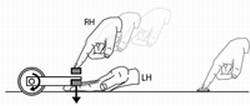When it comes to sensation, our brain seems tuned to the unexpected

On the basis of observations of how we interpret the sensation of a simple finger-tap, researchers have advanced our understanding of how the brain sorts important, externally-derived sensations, such as those created by an insect crawling on the skin, from unimportant, internally-derived sensations, such as the brush of one's own hand. The new study is reported in the June 21 issue of Current Biology by researchers Paul Bays and Daniel Wolpert of University College London and Randy Flanagan of Queen's University, Canada.
Image credit: Bays et al./Current Biology 2005.
Our senses are constantly inundated with information from which the brain must select the most important in order to guide our behavior. Because the brain is interested in novel information, it tends to discount sensations that result directly from our own actions, such as when we touch one part of our body with another. It has been suggested that a brain mechanism predicts these sensory signals in advance and attenuates them before they reach awareness. This may explain, for example, why the sensation of tickling yourself feels so much weaker than that of someone else tickling you.
The research study reported this week supports this theory. Participants in the study were asked to use a finger on their right hand to tap a finger on their left hand. A computer-controlled device between the fingers could delay or advance the transmission of the tap to the left finger. The sensation of touch in the left finger was found to be reduced during a time window centered on the time at which the fingers would normally make contact. This phenomenon, whereby the brain seems to anticipate when a self-derived action should be perceived, may have the effect of making a touch from an external source easier to detect. The findings suggest that an element of prediction is involved in the attenuation of internally-derived sensation and that the attenuation is not merely associated with the body's movement per se.
Source: Cell Press


















